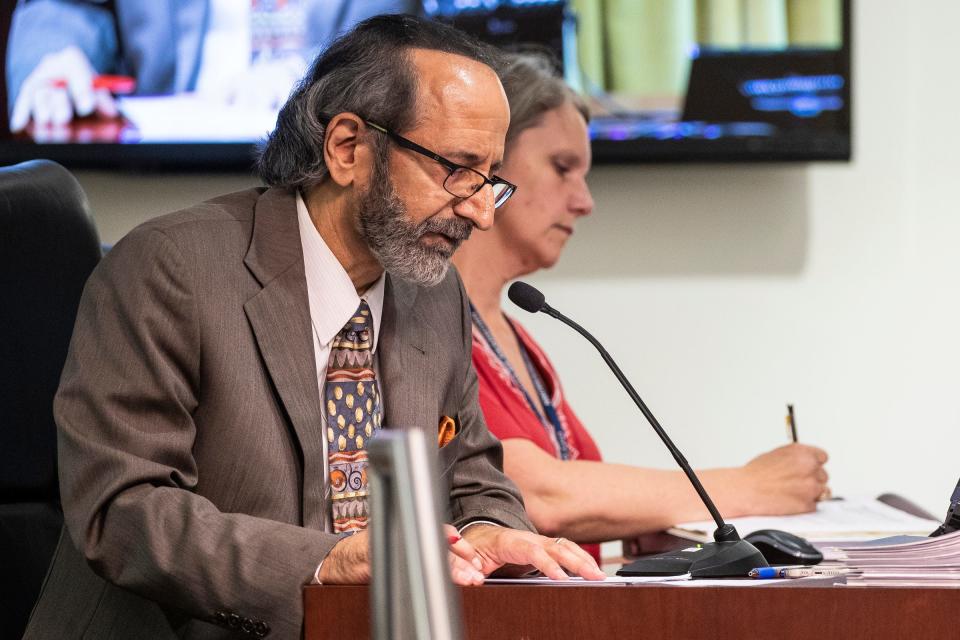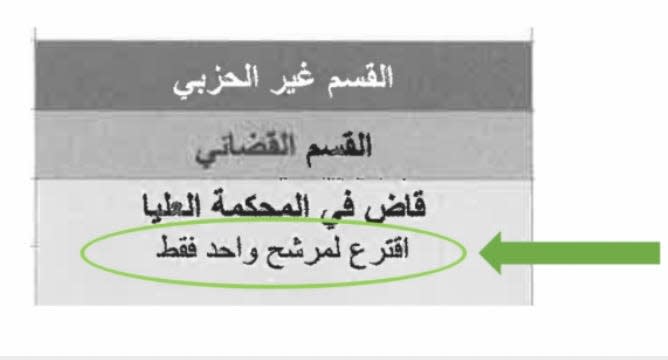Arabic-language ballots in Dearborn have error, City Clerk says
Arabic-language ballots printed in Dearborn for the November election were issued with an error, and all voters who have the translated ballots or requested them are being notified, City Clerk George Darany said.
The mistake appears in the portion of the ballot listing candidates for Michigan Supreme Court, Darany said in a news release. The error affected 34 Dearborn voters who requested Arabic-language ballots as of last Thursday, Darany said.
The Arabic-language ballots read mistakenly that voters should choose "not more than one" candidate. It should have instructed that voters choose "not more than two." There are two open seats on the state's Supreme Court.
In an email to city council members obtained by the Free Press, Darany said a language access commission appointed by Mayor Abdullah Hammoud and the city council was responsible for the mistake, adding they were under tremendous pressure to finish the translation in time for the November election. Darany also complained that his previous warnings about the city needing more time to implement Arabic-language ballots went unheeded.
The city's release, issued Thursday, did not say who made the error or who conducted the translation for the ballots. City spokesman Bilal Baydoun did not respond to emails asking who made the error on the ballots.
Osama Siblani, publisher of the Arab American News, said Monday night he and others at his Dearborn newspaper completed the translations, and he also reviewed the final ballot before it was printed by Dominion. Siblani was part of a three-member volunteer commission appointed by Mayor Hammoud and council earlier this year; Siblani said the other two members, Kassem Doghman and Ali Ajami, were not involved with this translation. The Arab American News did the translation and review at no cost to the city, he said.
"We made a mistake," Siblani told the Free Press. "We did not have enough time to review the ballot."
Siblani said it's unclear whether the Arab American News made the mistake when they initially translated it, or if the printer or a government agency made the error by not using the right column on the spreadsheet. Regardless, he said he made a mistake when reviewing the ballot by failing to catch the error.
"There is no excuse for the mistake," Siblani said. "And nobody is blaming it on anybody else. But the system itself is very complicated."
The process starts with Wayne County giving the city clerk an Excel spreadsheet with various sections of the ballot, Siblani said. The clerk then gave it to the Arab American News for translation.
"They don't give us the ballot to translate, they give us a spreadsheet on Excel," Siblani said.

The Arab American News then translated the various parts of the ballots and sent it back to the clerk. The clerk then sent it to the county and the county gave it to Dominion for printing, Siblani said. It was sent back to Siblani to proofread and confirm it was accurate. He said they only had about two days to proof the ballots.
Siblani said he was notified of the error on the ballot when someone contacted him. He said he promptly alerted the clerk and worked with them to alert the voters affected.
"Upon learning of the error, our office immediately notified the State of Michigan Election Bureau and determined the number of absentee voters who needed to be notified," Darany said in a statement.
Darany said his office conducted "a thorough and accurate accounting of Arabic absentee ballots," determining 34 Arabic absentee ballots were sent out and, of those, 11 were completed and returned to the clerk's office as of Thursday night. There are 23 outstanding Arabic absentee ballots not yet returned, Darany said.
The city has contacted all 34 voters, Darany said.
"The error occurred from an oversight on the part of the Language Access Commission appointed by the Mayor and Council," Darany wrote the email to City Council. "They were under a tremendous amount of pressure to get the translations completed in a very short time period between when the ballots were available for review and when the Wayne County printer needed them in order to print them in time for all cities in Wayne County."

In contrast to other states, Michigan does not have many municipalities offering non-English language ballots. The U.S. government has certain guidelines that need to be met before such ballots can be used. The move to have Arabic-language ballots initially received pushback from Wayne County Clerk Cathy Garrett and others. Dearborn is 47% Arab American, the highest percentage among cities in the U.S., according to census data.
Earlier this year, Dearborn City Council approved three resolutions calling for Arabic-language ballots. Councilman Mustapha Hammoud initially introduced the resolution. At the time, Darany had expressed concern about getting it done in time for elections in 2022, saying it would require time and manpower the city may not have. Garrett also initially expressed concern about the ballots, questioning whether there was a legal basis to have them. She later supported the ballots.
More:Push for non-English language ballots in Michigan finds obstacles, challenges
Darany reiterated his earlier concerns in his email to city council members last week, telling them of the ballot error.
"The State, County and my office warned, from day one, that to insure a smooth and accurate process, at least one year was needed to add another language ballot to an election," Darany wrote in his email. "The time is needed for coordination between the State, County, local Clerk's office and the tabulator vendor. We insisted that if proper time was not allowed, errors could happen. That warning proved to be accurate."
Darany added the city has contacted everyone affected.
"All 34 voters who requested an Arabic Ballot have been contacted by phone or email and a letter was hand-delivered to everyone of those voters' homes," Darany wrote. He said the mayor's office helped them with providing interpreters when contacting the voters.
"They were also informed that they could, if they so choose, make changes to the affected section on their ballots by visiting the Dearborn City Clerk’s Office," Darany said in the news release from the city.
It's unclear whether the city found additional voters affected since Thursday. Darany did not respond to an email from the Free Press asking for updated numbers.
Earlier this year, the city of Dearborn had a contract with Global Interpreting Services of Clinton Township to translate Arabic-language ballots in the August primary. That translation was reviewed and proofed by the three-member commission Siblani was part of.
But Global did not have a contract for the November election and was not involved in the latest translations, Global President Dawn Flanigan told the Free Press on Sunday.
Related:Volunteers help with accuracy of Arabic ballots in Dearborn
Darany said the city has been seeking guidance form the state's Election Bureau.
"Moving forward, all Dearborn election officials have been instructed to provide voters a written statement explaining the error on the Arabic ballots, in accordance with guidance from the State of Michigan Election Bureau," Darany said in the city's statement. "This statement will be provided only to those who elect to use an Arabic ballot, whether in early or absentee voting or on Election Day. It is important to note that the Arabic ballots have been tested in accordance with election protocols, and the ballots can accurately register up to two selections in the affected section."
Aneta Kiersnowski Crisp, press secretary for Secretary of State Jocelyn Benson, said Monday to the Free Press: “The Bureau of Elections provided guidance to the clerk’s office to ensure that all Dearborn voters are informed and able to vote for their preferred candidates.”

In July, a few weeks before the August primary, Benson touted the ballots as the first time Michigan would have them in the Arabic language.
"In a moment where there are so many efforts to divide and deter citizen engagement, it's inspiring to see Dearborn, Hamtramck and Wayne County leadership come together to show government can be responsive to citizens' needs and deliver results," Benson said in a July statement. Darany said "these ballots were subject to a thorough review by a highly selective translation committee. However, errors can still happen."
Darany added city officials regret the error, but "are committed to working closely with all county and state election officials to ensure a fair and transparent resolution."
"We need to learn from this," Siblani said. "In the future, we need more time not only to translate, but to proof the ballots."
Contact Niraj Warikoo: nwarikoo@freepress.com or Twitter @nwarikoo.
This article originally appeared on Detroit Free Press: Arabic-language ballots in Dearborn have error, City Clerk says

